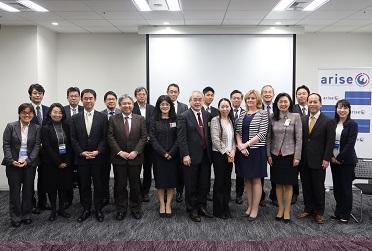
Japan ARISE members and UNISDR staff at the annual symposium held before the commemoration of the Great East Japan Earthquake and Tsunami
By Yuki Matsuoka
TOKYO, 13 March 2018 - A study of the 2011 Great East Japan Earthquake and Tsunami has emphasized the importance of economic recovery to the well-being of communities in the post-disaster phase.
Professor Itsuki Nakabayashi from Meiji University noted that, according to his study, both the availability of jobs and livelihoods, and the revitalization of commercial districts in the neighborhood, are integral to individual perceptions of recovery, and thus the resilience of local businesses plays a major role in post-disaster community well-being.
Prof. Nakabayashi was speaking at the annual symposium of ARISE Japan, the national branch of UNISDR’s private sector network, held on March 7, four days before the 7th anniversary commemoration of the 2011 disaster which also triggered the worst nuclear accident since Chernobyl.
In a panel discussion with representatives from national and local governments, civil society organizations, academia and the private sector, Mr. Yoshiki Kinehara from Mitsubishi Research Institute and a member of ARISE Japan, said: “Business continuity is about planning for, and ensuring, the continuity of ‘business as usual’”.
He said that it applies to local governments that must continue public services as usual, and businesses and individuals, who must continue to provide, and consume, products and services as usual. Resilient communities are communities where everyone ensures their own continuity of ‘business as usual’.
The Japanese Government takes seriously the issue of stranded commuters, which was highlighted by the experience of Tokyo in the 2011 disaster. A private sector representative in the audience, Mr. Takayuki Haryu from DIC Corporation, contributed his organization’s good practice of fostering a working relationship with local neighborhood associations expected to host a large number of stranded office workers.